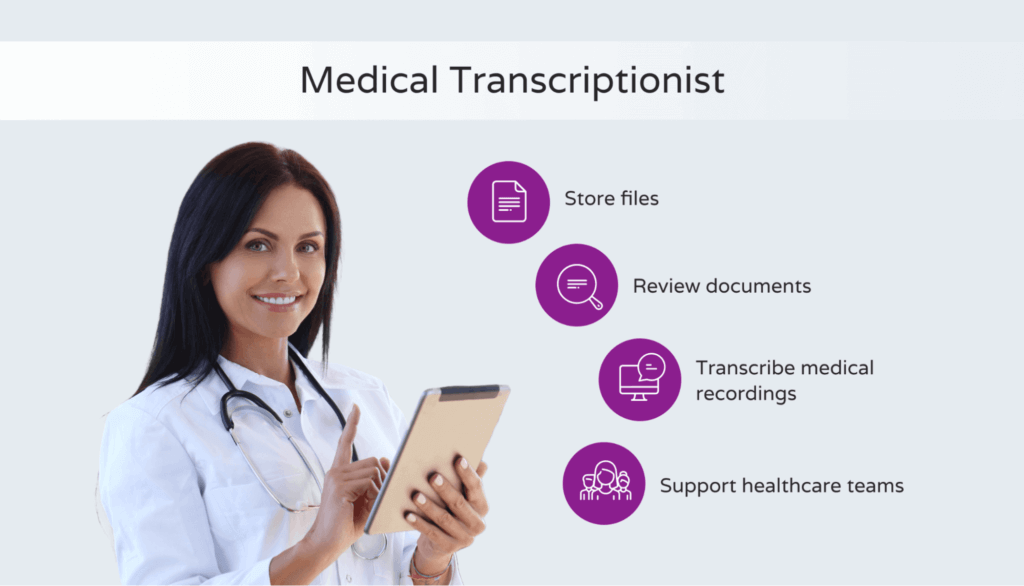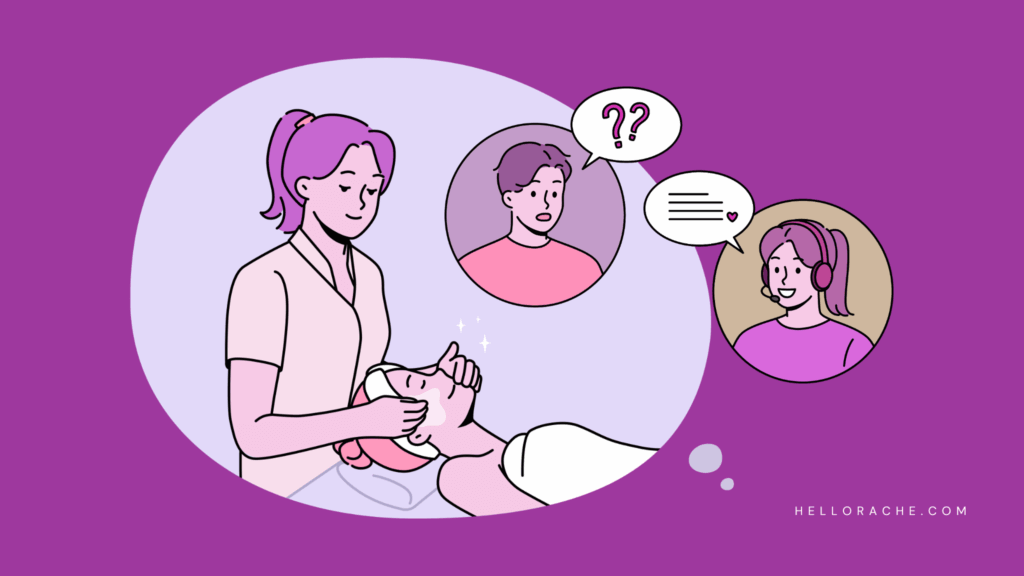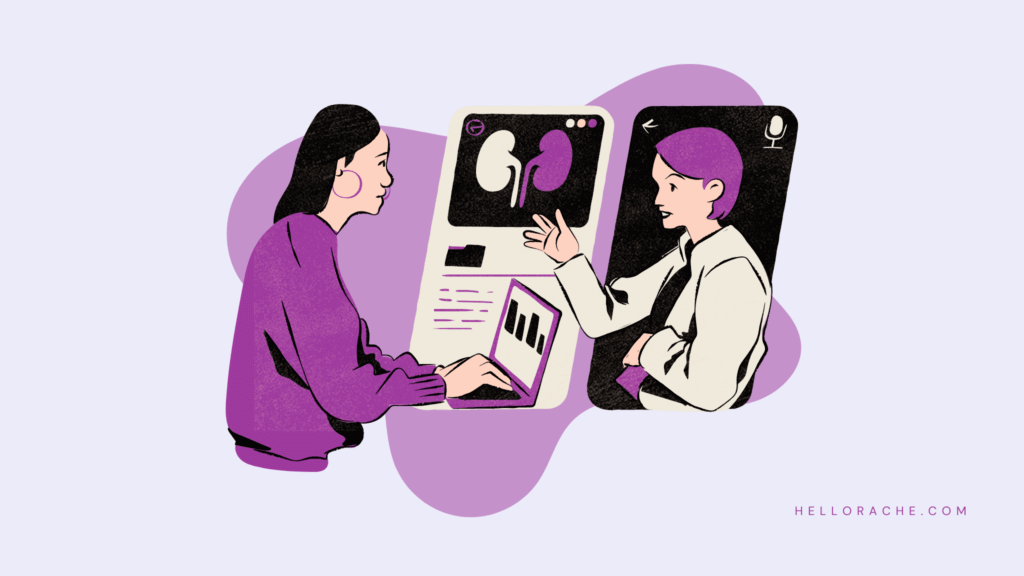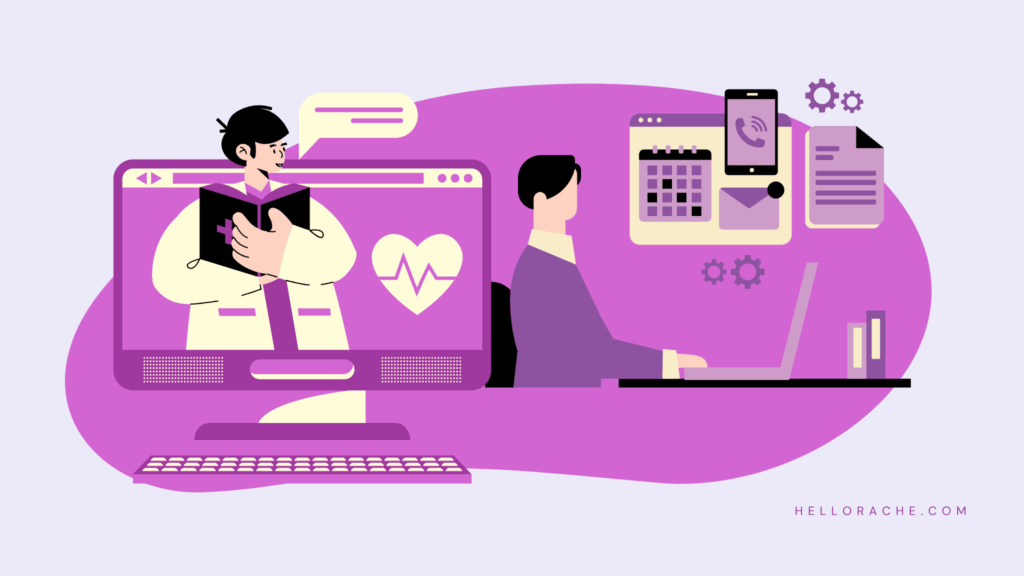There are more than 51,612 medical transcriptionists working in the US. Healthcare providers rely on these team members to transcribe audio files into written documents.
If you are considering a human transcription service, you may be wondering whether it's right for you. To help you decide, we've put together the following guide.
Read on to learn more about the role of a medical transcriptionist and how they can support medical professionals.
We'll tell you what skills to look for and explain the difference between in-person and remote options.
Finally, we'll give you an insight into the average medical transcriptionist's salary.
What is a medical transcriptionist?
Medical transcriptionists support medical teams with their written documents. They listen to voice recordings and transcribe them into an electronic format.
For example, a health practitioner may record details of treatment plans, and the transcriptionist will listen carefully and type the information into a report.
A range of different healthcare providers employ these workers. A medical transcriptionist can work in a hospital setting or in an acute care facility. Some work for private practice family doctors, while others are employed by insurance companies.
The role can be part-time or full-time, and it’s not uncommon for medical transcriptionists to work remotely from home.
Virtual medical transcriptionists can give you the support you need at a fraction of the cost. At Hello Rache, we pride ourselves on our professional transcription services. A remote option could be the time-saving, cost-effective solution you’ve been looking for.
Get in touch with Hello Rache to learn more.
What does a medical transcriptionist do?
The job duties of a medical transcriptionist can vary. When doctors and other healthcare professionals create recordings, the transcriptionists will turn them into medical documents or electronic health records.
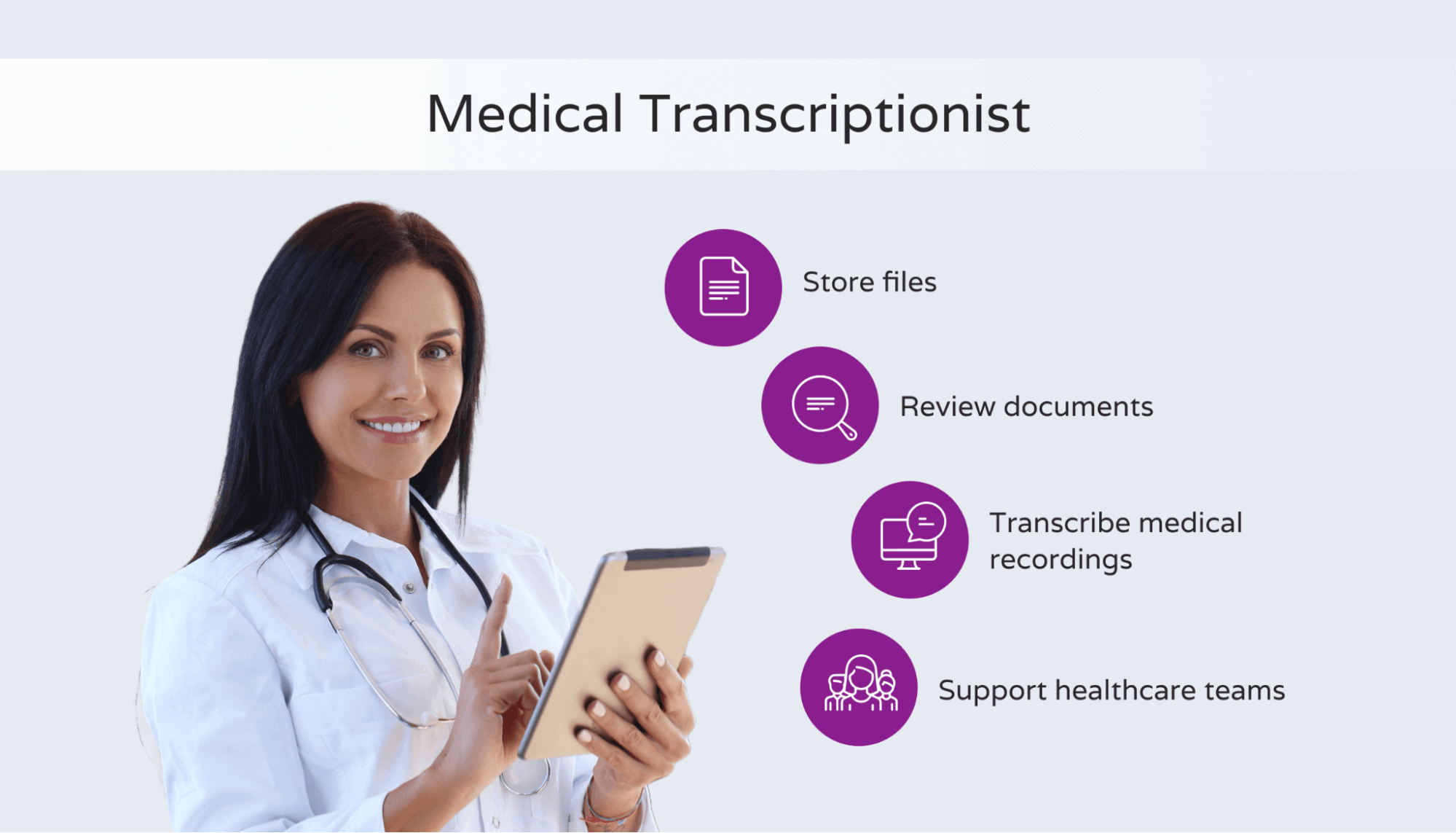
For example, recordings can include letters, updates to patient files, referrals, health programs, discharge summaries, and other notes. It’s a time-consuming, repetitive role, and these workers need to complete the documents in a timely fashion.
They can edit reports and look for any dictation errors. Medical transcriptionists work closely with healthcare providers to ensure the information is accurate and current.
Sometimes, voice recordings are accompanied by handwritten notes and the transcriptionist needs to interpret any abbreviations or medical jargon. They can also receive dictation in shorthand or via speech recognition technology.
Experienced medical transcriptionists are committed to maintaining patient confidentiality and following strict privacy regulations.
The role can involve sitting for extended periods and hours spent in front of the computer.
How to become a medical transcriptionist
People who are interested in a medical transcription career will need to complete training for the role. It can be a difficult skill that requires patience and practice.
There's a high demand for remote transcription roles as more people want to work from home. This means employers can choose the right people for their job postings.
Most professional medical transcriptionists have industry experience. A medical transcription certification is also recommended. For example, they can become a member of the Association for Healthcare Documentation Integrity (formerly the American Association for Medical Transcription) and complete the certification process.
Training programs will cover various topics, including privacy laws, transcribing audio files, maintaining patient records, and developing editing skills. Knowledge of medical terminology is essential. Additional training may be required to work in different departments.
Workers need access to transcription equipment, such as voice-recording devices, headphones, and a computer. The physician may use a traditional recording device or use software to create digital audio recordings.
Those who want to work for Hello Rache need to fill out an extensive application. It includes training and a background check.
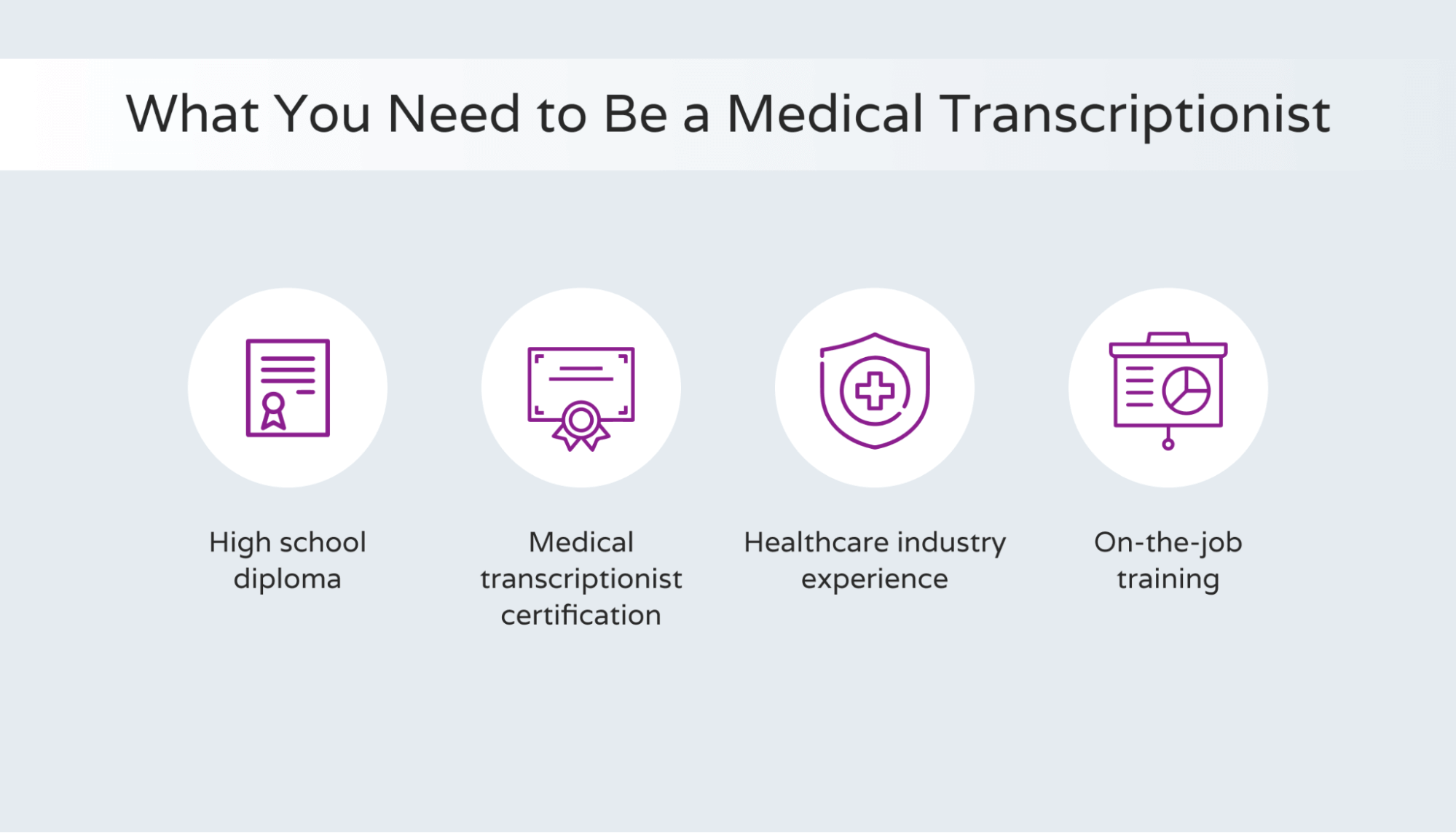
What is the difference between a medical transcriptionist and a medical scribe?
Medical transcriptionists and medical scribes perform similar job duties. However, there are slight differences between the two roles.
As we’ve discussed, a medical transcriptionist works with recordings. They don’t sit in the room with patients, and it’s usually a flexible position that can be done remotely.
Medical scribes usually transcribe information in real-time. For example, they can attend healthcare appointments and record information, take notes, and update patient files on the spot.
Some medical scribes work remotely. These workers are called virtual medical scribes. They can still sit in on appointments, but they do it virtually. They can connect with physicians via video chat or telephone. Virtual medical scribes may also work with recordings.
If you want to learn more or book this service, you can visit our virtual scribe page.
How can a medical transcriptionist help you?
If you have a medical clinic, a transcriptionist can help you.
Here's how you can get the most from your healthcare documentation specialist.
1. Accurate record-keeping
Medical transcriptionists gain important skills during their job training. They learn how to accurately transform voice recordings into digital medical records.
Confidential patient files can be accessed long-term, so it's important that the finished transcriptions are accurate and up to date.
Plus, the records can be shared between physicians and other healthcare workers. When you store the correct history of patients, they'll always receive the proper care.
Some medical companies rely on accurate legal transcription. For example, transcriptionists can type reports for workers' compensation, employee insurance claims, and liability insurance.
2. More time for your patients
Medical transcription can be time-consuming. If your practice is busy, you'll see multiple patients daily.
When you have to type up reports for each person, you may have to work late just to keep up.
However, if you use the services of a medical transcriptionist, you'll have more time for your patients. You can book more appointments and provide high-quality service every time.
All you have to do is forward your audio files to the medical transcriptionist, and the rest will be taken care of.
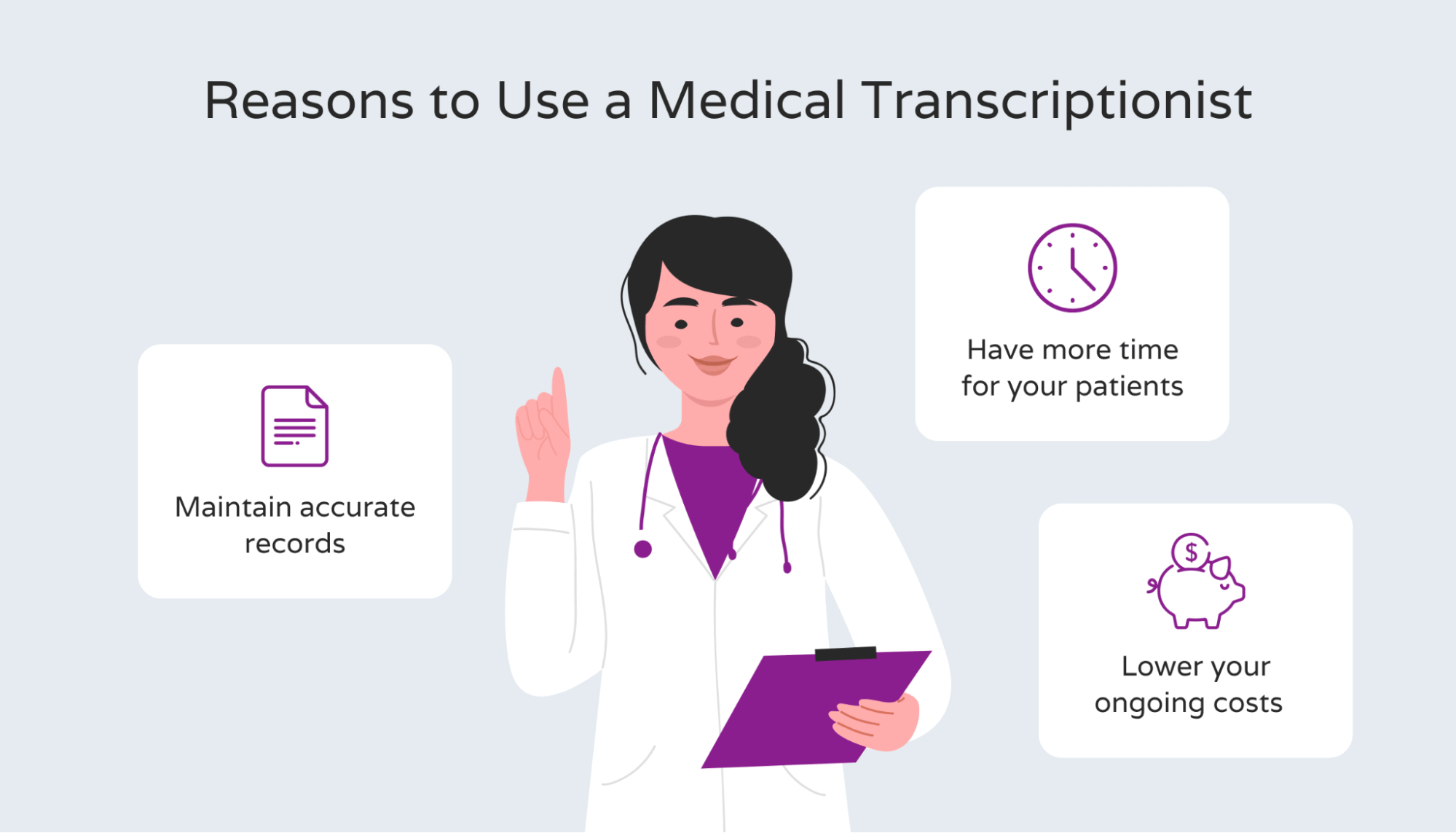
3. Medical knowledge
Medical transcriptionists use their medical knowledge to decipher complex recordings. For example, medical abbreviations and jargon may need to be interpreted.
Each patient has their own unique healthcare story. Their medical transcription documents may include details of treatments, conditions, symptoms, and health insurance benefits. The transcriptionist will know how to organize these details correctly.
Some companies use speech recognition technology that automatically translates recordings into text. A medical transcription editor can check for mistakes.
Medical transcriptionists often have a background in healthcare. For example, they could be nurses or medical students.
4. Give patients the right treatment
When you see a patient, you might make changes to their current treatment plan. There could be new prescription medications or changes to their diet and lifestyle. You may also order tests and scans and specialist referrals.
You might not have time to update all of the medical files yourself. This could cause a delay in treatment and can cause confusion between healthcare providers.
A medical transcriptionist can type up the details for you as long as you record verbal notes. They work quickly and efficiently, so patients will always get the right medications and treatments.
Hello Rache medical transcriptionists are fully trained and certified by HIPAA. All of our workers have to pass a background check.
5. Access remote team members
You probably already have a dedicated healthcare team. However, using a virtual medical transcriptionist can give you extra help when you need it.
The medical transcription industry is flexible, and many of the workers are remote. They work from home, so you don’t need to worry about office space or contracts.
It can be challenging to find and retain experienced staff in some locations. When you choose a remote transcription company like Hello Rache, you’ll get access to trained, efficient transcriptionists. It doesn’t matter where your practice is because help is available globally.
Even when they’re working remotely, most medical transcriptionists are organized and self-motivated. They know how to work independently without any hand-holding.
6. Get support with other clerical duties
Medical transcriptionists often have other administrative skills. If there’s downtime, they can support your team with clerical duties.
In addition to transcribing confidential reports, you can get help with answering phones, creating presentations, responding to emails, and scheduling appointments. If you need more support, most clerical duties can be done virtually.
For those needing long-term administrative help, a healthcare virtual assistant is an option. Even if you already have a team of office staff, a remote worker can take care of repetitive tasks and respond to customer queries.
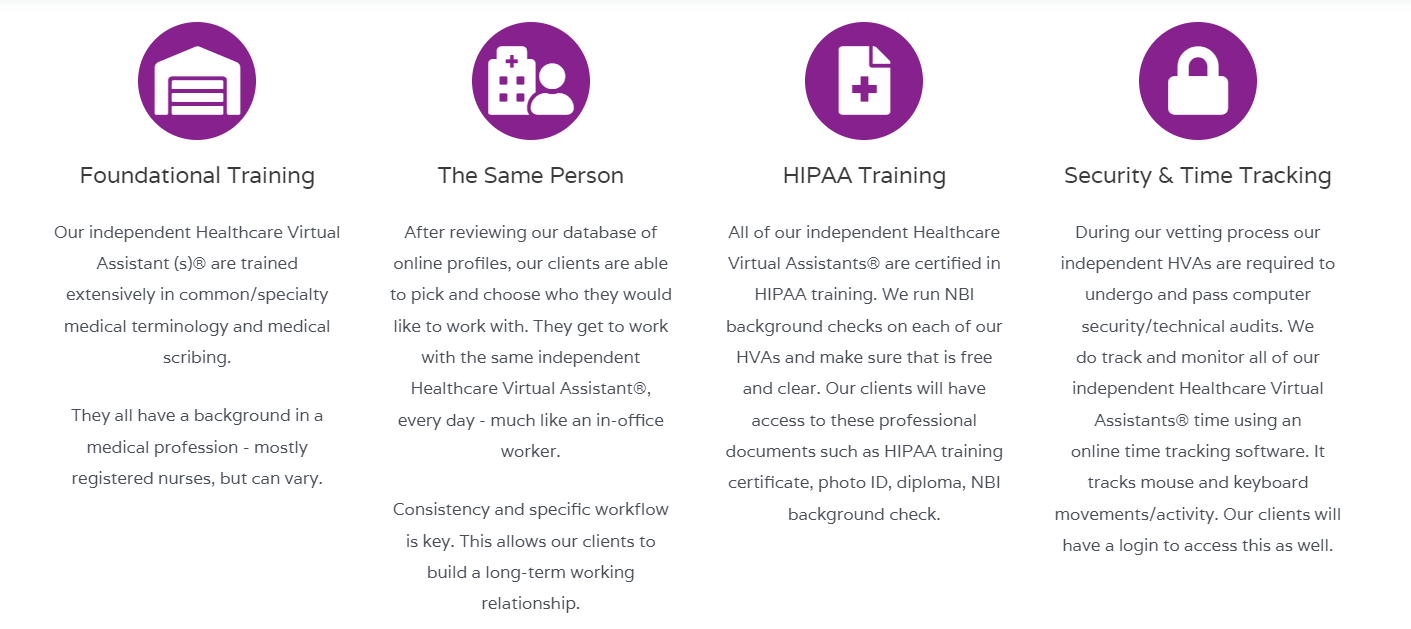
Some healthcare virtual assistants have additional education in areas such as bookkeeping, graphic design, social media management, and customer service.
When you lighten the workload on your existing team, you’ll create a better work-life balance and a more positive company culture.
7. Save money
As a busy health professional, you'll be juggling budgets, staff, administrative duties, and patients.
By outsourcing the transcription of your audio files to dedicated workers, you can save money. With more time for your patients, you can open up additional appointments and improve your bottom line.
If you choose a virtual medical transcriptionist, you won’t need to hire a new team member. So, there'll be no contracts, and you won't have to worry about time off, benefits, or sick leave.
They'll have their own tools, including a computer and internet, and you won't need to create space in the office.
Don't forget that remote medical transcriptionists can cost less per hour than in-person employees.
8. Flag mistakes
Healthcare practitioners can make mistakes. If medical reports have even the smallest errors, it can lead to the wrong diagnosis or treatment.
Then there's speech recognition technology. Health recordings and podcasts can use speech recognition software to auto-generate text. These aren't always accurate.
Medical transcriptionists can flag any dictation errors. Because they have some medical knowledge, they know what to look for.
If they find a mistake, they can check in to ensure the information is correct. High accuracy rates will have a positive impact on your service. You’ll provide better patient care and maintain your good reputation.
What are the top medical transcriptionist skills?
What are the skills you should look for in a medical transcriptionist? Look for a mix of hard skills and soft skills.
Here's what you should look for when choosing a medical transcriptionist. Remember, they should also have experience in the healthcare industry or medical knowledge.
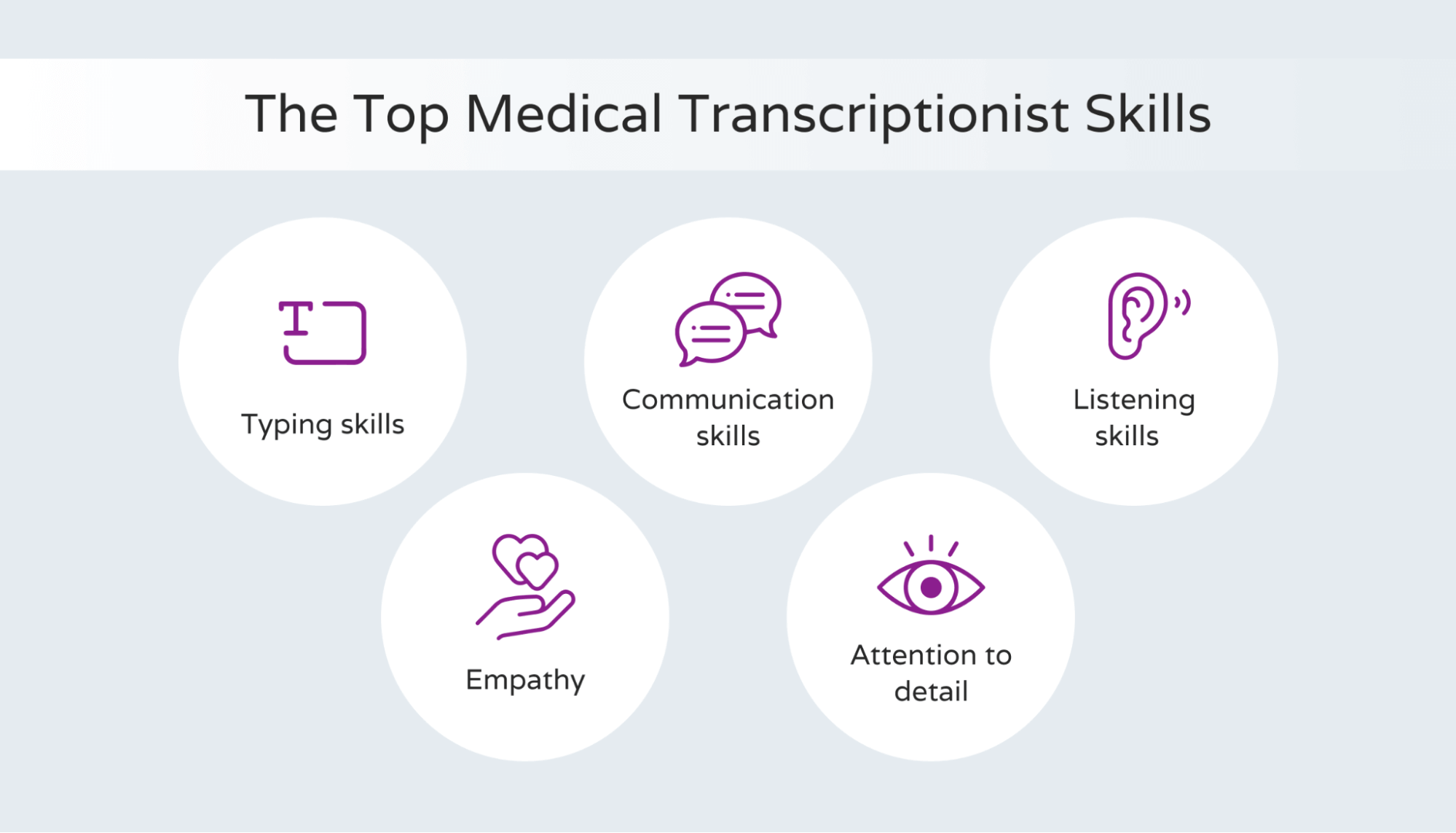
Computer skills
Medical transcriptionists need a range of computer skills. There'll be specific programs you'll want them to use, including software for maintaining electronic health records.
Fast and accurate typing is essential, and Microsoft Office skills are also important.
If they've had quality training, they'll know how to use audio recording devices and other tools required for the job.
They'll be working with sensitive data and medical history, so internet security should be a priority. A secure internet connection, password-protected computer, and antivirus software will give added layers of protection for your electronic storage.
If the medical transcriptionist works from home, they need to be confident in troubleshooting any technical issues. Critical thinking skills and problem-solving skills will help them do their job.
Listening skills
Listening skills are critical. Turning a digital recording into an electronic format can be a long process, especially if it's a larger patient record.
The medical transcriptionist needs a quiet space so they can carefully listen and interpret these recordings. We know accurate transcriptions are essential for patient care, and any mistakes can lead to negative health outcomes.
At times, it may be difficult to understand the medical doctor. There can be language barriers, or there may be background noise. For example, there may be other conversations, music, or machinery causing interference.
If the medical transcriptionist can't make out details such as prescriptions, hospital names, or specialist referrals, they may need to double-check the information.
Organizational skills
Next, we have organizational skills. Some days, there will be multiple transcripts to work on, so the transcriptionist will need to have good time management skills.
The actual dictation process can be fast-paced, and these workers can be faced with complex reports. Like any job in the healthcare field, being organized is an essential skill.
Plus, if you're looking for a remote medical transcriptionist, they'll need to manage their own workday. They won't have the hustle and bustle of a physical workspace to keep them motivated. So, they should be able to plan and complete each task on time.
Attention to detail
As a healthcare professional, you know how important it is to do your work to a high standard. For example, you provide exceptional continuity of care, maintain patient confidentiality, and follow all rules and regulations.
Just like you, a medical transcriptionist should have great attention to detail. Mistakes can lead to poor patient outcomes, and errors can have an impact on your entire practice. They should take care in their work and take pride in creating accurate documents.
When these workers complete a medical transcription training program, they'll learn the basics. However, attention to detail is a skill that requires continual focus.
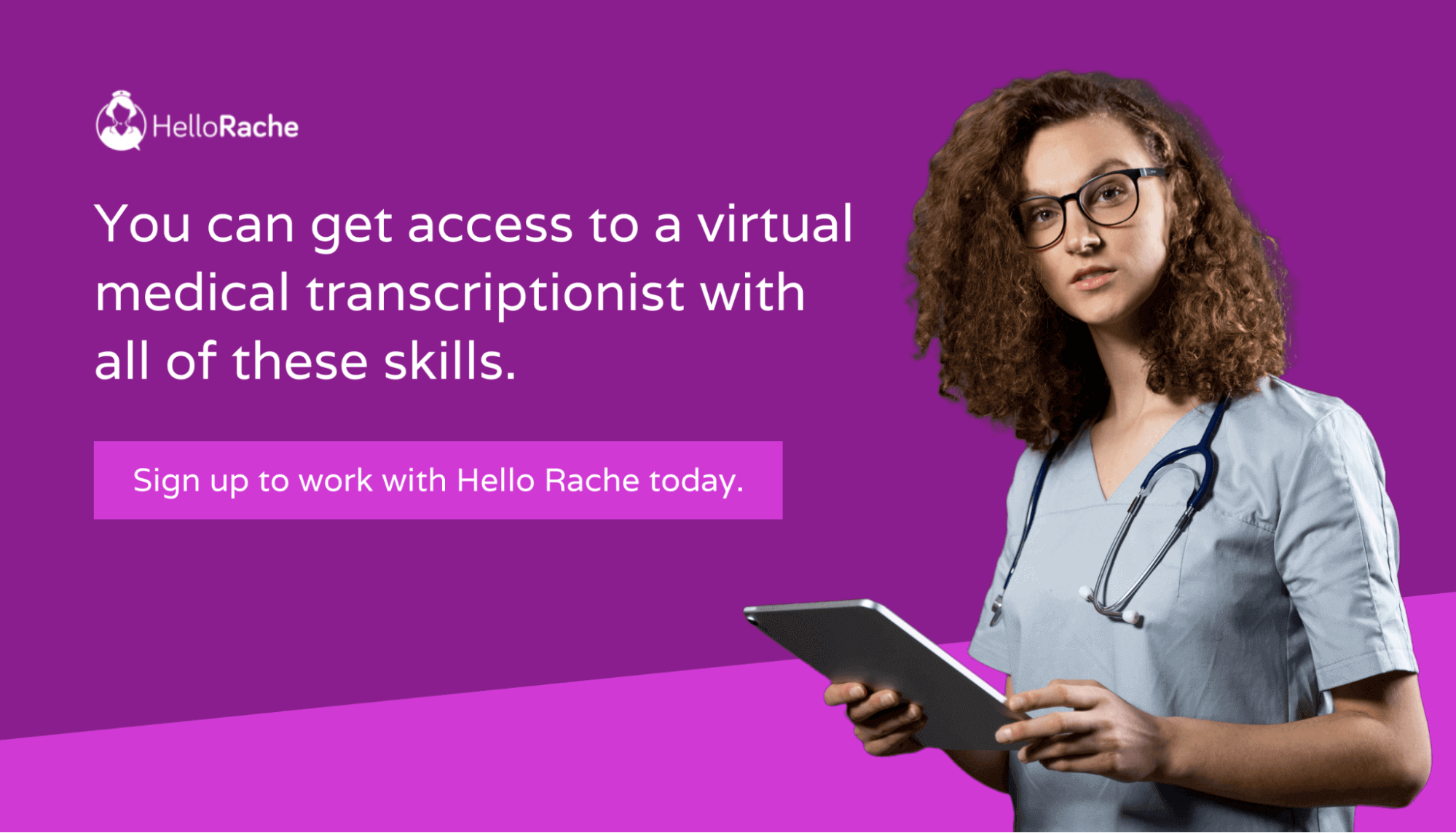
Excellent grammar and spelling
Medical transcriptionists need to have good English skills. An excellent command of the English language will make sure the voice files are transcribed accurately.
Plus, they need editing skills to update complex reports and formatting skills to make them easy to read by any health care provider.
Those working in the medical transcription industry need to decipher the correct spelling of patient names and be able to transcribe dictation in shorthand.
A medical transcription editor has to be able to spot any spelling and grammatical errors.
How much does a medical transcriptionist make?
The average hourly rate for American transcriptionists is $14.47 per hour. The average annual salary is $30,100.
Workers with an entry-level credential will make less than a more experienced medical transcriptionist. For example, the salary can range from $29,120 to $46,150 per year.
The rate can also vary between locations and where they work, such as in medical practices and hospitals.
The demand for medical transcriptionist jobs is going down slightly. By 2030, it's set to drop to -7%.
Don't forget; there's a cost advantage if you go remote. When you choose Hello Rache as your virtual transcriptionist company, your worker will still meet the minimum training requirements for a fraction of the cost.
In fact, it costs just $9.50 per hour to use our services.
The role of the medical transcriptionist
Do you need medical transcription services? We can help you record patient diagnoses and health history.
Whether you use a traditional voice recorder or prefer a digital format, a medical transcriptionist can help. Plus, when you choose Hello Rache, you don't need to have concerns about patient privacy. All our team members must complete medical transcription programs and be certified by HIPAA.
The right person can accurately transcribe confidential reports, so you can focus on giving your patients the correct treatment. Each finished report can be on your virtual desk when you need it, saving you time and money.
If your workplace has a demand for transcription services, get in touch with Hello Rache today. Want more articles like this one? Check out our blog.

